
by Regan Bervar | Oct 22, 2021 | Editorials
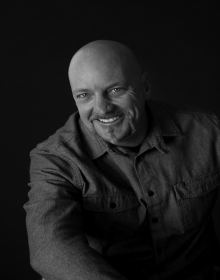 by Luke Schmaltz
by Luke Schmaltz

Seven Officers who hold this badge may soon be left empty handed.
An embattled Denver Police Department is learning firsthand what it means to operate under a mayor who insists on politicizing a private medical issue.
On August 2, 2021, Denver Mayor Michael Hancock issued an edict declaring that all city employees as well as some key private sector workers had until September 30 to get vaccinated for Covid-19. This, of course, includes police officers — seven of whom have refused to comply with the vaccination order. The group is currently taking legal action against the mayor’s office while facing disciplinary measures as well as termination of their employment.
Thinning Out A Skeleton Crew
Court documents show an injunction filed against the city by officers Dewayne Rodgers, Les Tucker, David Curtis, Bart Stark, Jonathan Christian, Nick Elliot, and Rich Ziegler. The suit was an 11th-hour attempt to dispute the vaccine mandate which, if not complied with, will result in 10-day unpaid suspensions followed by dismissal if not followed by the end of that time. At a time when theft, vandalism, assault, break-ins, drug trafficking, and trespassing have reached a fever pitch in the downtown area — it seems rather counterintuitive to sanction the wholesale termination of police officers who are making a choice which they consider to be a private medical matter.
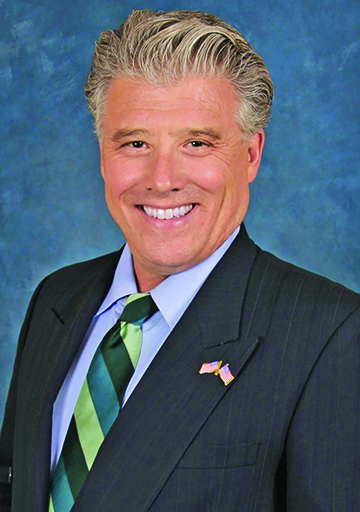
Attorney Randy Corporon, PC represents the seven Denver cops disputing the vaccine mandate.
Attorney Randy Corporon, PC, represents this group of police officers. He moved to block the mandate before District Court Judge Shelley Gilman on Wednesday, September 29. Judge Gilman dismissed the case, however, stating that the court had no authority over the issue because the officers did not exhaust all of their administrative remedies before taking the matter to court. Specifically, this would have been to first petition to the Denver Department of Public Health to overturn the mandate.
Red Tape Blues
In the meantime, Corporon has filed an administrative complaint with the Denver Department of Public Health (DDPH), and he is currently awaiting notice of a hearing being set. “The only thing they told us,” he begins, “is that they will set a hearing and they will let us know 10 days before that hearing.” Corporon feels that DDPH is deliberately hindering the appeal in order to goad the defiant officers into compliance. “The mystery of their process is whether they will expedite this or drag their feet,” Corporon explains. “The thing about these government entities and these big companies is that the longer they drag it out, the more people will just cave and get the shot.” Corporon explains why he took the matter to court before all administrative remedies were exhausted. “We believed that we had legal exceptions based on the exigency and the urgency, [as well as] the futility of going through that petition process first, but the judge disagreed.”
The immediate, blaring, disconcerting issue is the loss of qualified, able-bodied police officers at a time when the circumstances call for all hands on deck. When asked if he thinks the mandate will spur a mass-migration of police officers from the DPD, Corporon explains, “As much as I hate the practical result of it, I hope so. I don’t see any [other] way to stop this incredible, omnipotent, growing government power grab unless people don’t bite the bullet, accept the consequences and move on,” he says. “Some of these police officers are great cops with tons of experience and I’m sure they would be welcomed in other places like Texas or Florida or in cities that don’t try and force an untested treatment into people’s bodies.”
No Pain No Gain

Many contend that the COVID vaccines are experimental drugs which can cause adverse reactions.
Corporon further explains why resistance from the people in the trenches is the best way to counteract government overreach. “The short-term pain will be worth the long-term gain if more and more people stand up,” he says. He then goes on to explain the collective concerns among his colleagues and clientele about the vaccines, “I worry about the long-term effects. If somebody has the vaccine and new strains of the virus come on, is their body going to react improperly? We have heard about risks to reproductive systems, and for people who are giving this to their kids … God almighty,” he attests. “I have cases in my office now where divorced parents and even parents who are still together are fighting legally whether to vaccinate their kids as young as 10 years old.”
Corporon goes on to express his outrage about the wholesale public adoption of these untested treatments. “I am baffled by the media propaganda, the fear and the blind trust in unelected bureaucrats and so-called scientists who change their own positions constantly,” he says “I just had a news crew over here interviewing me about the Eric Coomer defamation case. Of course, they show up masked and they wouldn’t come inside my building because they found out I was unvaccinated. I’m not sick, plus, they have masks on, and we are maintaining a distance of six feet apart. OK — we can stay out here in the rain, it’s fine with me.”
While the charge to overturn the mandate seems daunting, Corporon maintains that a positive outcome for his Denver police officer clients is not out of the realm of possibility. “The best outcome would be an agreement that the orders were issued in error and that they would be rescinded. Of course, you can’t un-vaccinate people but, at the very least, you could restore cops who’ve lost their jobs and you could restore their pay.”
The counterproductivity of the issue is typical of Denver politics where counterintuitive policies and backward thinking are the order of the day. It would seem that in an effort to “protect” citizens from harm by mandating vaccination for police officers, the populace is being left even more exposed to danger by firing the cops who want to be there to serve and protect.
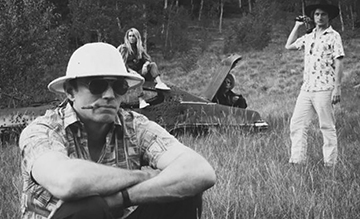
by Regan Bervar | Oct 22, 2021 | General Featured
“When the going gets weird, the weird turn pro.”
 by Luke Schmaltz
by Luke Schmaltz
Fear and Loathing in Aspen — a forthcoming film set in Colorado’s most notorious mountain town — is packed with parallels to current issues, rich with the warm, grainy texture of 20th Century celluloid, and thick with finely tuned, bittersweet irony.
Unlike predecessors, this film offers a more subtle, nuanced interpretation of the outlandish escapades of the late writer — Hunter S. Thompson. Director Bobby Kennedy III delivers a concise, thoughtful, and well-rounded narrative of Thompson’s 1970 run for Sheriff of Pitkin County, Colorado, on the Freak Power ticket.

Hit Movie: Fear and Loathing in Aspen is a direct hit with many of today’s hot-button issues.
In one scene, Thompson (masterfully played by Jay Bulger) says, “The freaks — they’re everywhere … and they can vote.” He continues his commentary on the local counterculture with more poignant observations, “One of the main things I’ve learned out here is there are all kinds of very capable people wandering around with no place to use their energy. If we can put this energy to work, we’ll have a helluva tool on our hands.”
Throughout the piece, Bulger, who bears an uncanny resemblance to his subject, manages to deliver a convincing portrayal of Thompson while somehow avoiding the character tropes, overblown mannerisms, and hyper-exaggerated speech patterns Thompson’s persona has elicited from those who have portrayed him in the past. Here, viewers are treated to a glimpse into the psyche of a deeply complex character without having to endure the gallivanting around and flailing about of cinematic forebears. Rather, Bulger delves deeper into the humanity of the character, using a somewhat even-keeled anchor point to mount emotional plunges and manic ascents.
Visually, the film pays on-target homage to the wobbly, hand-held 8mm footage that captured many moments of the actual events in the story. Kennedy masterfully rotates between smoothly edited, narrative scenes, and grainy handheld sequences that, were it not for impeccable continuity, could be mistaken for amateur found footage from 1970.
Parallels Abound
Although the story is 50+ years old, the film zaps a cattle prod to a number of today’s hot-button issues. Thompson’s Freak Power party runs the very essence of a grassroots political campaign, echoing current political concerns such as voter reluctance, voter suppression, and election fraud. Meanwhile, the “freaks” of the Aspen Valley — fringe-dwelling refugees of the status-quo — are eerily reminiscent of the drug-addled tent-dwellers of today’s Denver, although in the movie they represent heroism, positive change, and social evolution. And then, there are the conservative gentrifiers who are systematically overtaking Aspen and making Thompson’s proposed utopia an all-but-impossible pipedream. Given the overrun, overdeveloped, and overpriced state of Pitkin County today, it makes you wonder how vastly different that sector of Colorado would look had Thompson been victorious.
A Brazen Platform

Portrayal: Actor Jay Bulger delivers a nuanced, spot-on portrayal of a pop culture legend.
As one would expect, his platform was as sweeping and rebellious as the man’s reputation. “We will sod the streets at once” he begins. “Rip up all city streets with jackhammers and use the junk asphalt, after melting, to create a huge parking and auto storage lot on the outskirts of town. We will change the name of Aspen, by public referendum, to Fat City, to prevent land rapers, greedheads, and human jackals from capitalizing on the name ‘Aspen.’ Aspen, Colorado, would no longer exist, and the psychic alterations of this change would be massive in the world of commerce. By this approach, making hundreds or even thousands of individuals personally responsible for protecting the animals, fish, and birds that live here, we would create a sort of de facto game preserve without the harsh restrictions that will be forced on us if these bloodthirsty geeks keep swarming in here every autumn to shoot everything they see.”
Acerbic, To Wit

In Character: Jay Bulger stays entrenched in character throughout the film.
Alas, the irony that Bobby Kennedy III deals out to viewers is deeply poetic. He skillfully helms a cinematic vehicle that is clearly aimed at the establishment, the status quo, the Good Ol’ Boys Club that his grandfather and great uncle (Bobby and John F. Kennedy) attempted to topple.
While the outcome of Thompson’s run for Sheriff of Pitkin County is well known, Fear and Loathing in Aspen is not to be dismissed for simply retelling the bittersweet parable of an American underdog. Lest it be forgotten, this country was founded by rebels with revolutionary thinking and radical solutions. As Bulger soliloquizes at the end of the third act, “If you ever get the chance to sweep the fatbacks off their feet, don’t f@*k it up.”
Fear and Loathing in Aspen is indie filmmaking at its finest, hearkening back to the glorious cinematic movement of the 1990s where formula, big name actors, plotless blather, and CGI sensory overload were not the order of the day. This film deserves a fair shot at the permaculture, for sheer entertainment value as well as historical significance. Should you crave a cinematic experience that requires a bit of thinking, a fair modicum of empathy and a healthy sense of the ridiculous — this film is for you.
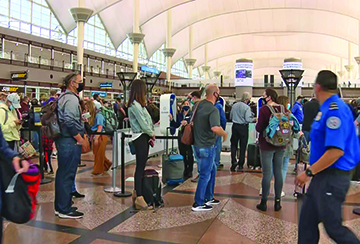
by Regan Bervar | Oct 22, 2021 | Main Articles
A User’s Guide To Navigating DIA During The Busy Winter Months
“I’m one of those people at the airport holding a pillow like a little kid.”
 by Luke Schmaltz
by Luke Schmaltz
Every holiday season, in the far northeast corner of gerrymandered Denver County, Denver International Airport bustles like a series of big top circus tents swarming with activity. Somewhere around the beginning of November through the new year, this hub of hustle begins to sing with every possible tone of neurosis brought on by the madness that is inherent to holiday travel.
Thousands of Denver residents, in their obligatory impetus to see their loved ones every year, scramble out of bed during the wee hours, grab their luggage, and head out to what may unfold as a day without incident or — more likely — an experience that reads like a migraine-inducing travel nightmare. The problems begin when you get in the car and head toward Peña Boulevard and can continue to the security lines, the concourses, and beyond. Thankfully, there are a few steps you can take for navigating this gauntlet of woe which may help your excursion to be a tolerable one at the very least.
Get There For Cheap
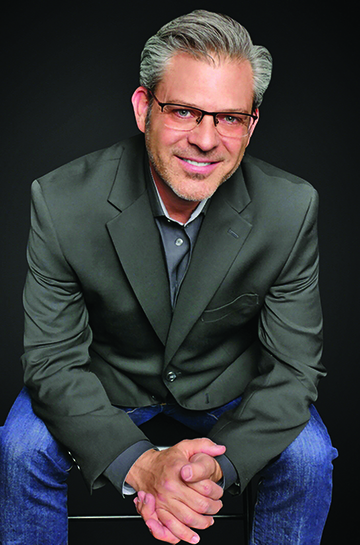
Real Estate entrepreneur Tyson Murray has figured out the hassle-free secrets to DIA travel.
Denver realtor and onetime DIA bartender Tyson Murray offers a few insider tips from a guy who used to commute to the airport multiple times a week for several years. He emphasizes the importance of not driving as a means of saving time and money while avoiding unnecessary stress. “Driving to DIA sucks,” he attests. “It’s expensive to park there, and as of late, there have been a rash of car thefts and break-ins in the parking lots. The train is cheap ($10.50 each way), reliable, always on time, and super easy. It’s 35 minutes from Union Station to DIA,” he says. Additionally, it is important to note that due to staffing shortages related to the Covid-19 pandemic, the Mt. Elbert and Pikes Peak shuttle parking remain closed.
Connect With Ease
Folks who are willing to forgo the autonomy of driving their own car can discover a respite of convenience amid the headaches of traffic and parking. “Going to DIA has never been easier in my opinion,” Murray explains. “I love taking the Light Rail from Union Station. I love that building and I’ll take any excuse to hang out there for a few minutes.” Murray also offers a valuable tidbit about circumventing long security lines. “If you disembark from the Light Rail at the South Entrance and South Security Check line, take the extra five minutes to walk to the NORTH Security Check line — it’s usually less crowded. Or, if you don’t mind walking an extra half mile or so, go upstairs to the Pedestrian Bridge security and catch the train from Terminal A if you need to go to Terminals B or C. Also, usually much faster.”
Arrive Far In Advance
Murray also urges travelers to be extra vigilant with their timelines. “Get there early,” he exclaims. “I’m the guy who would rather be an hour early than 10 minutes late, So, I always go at least a half hour before I need to, which means getting to the airport two or so hours before my flight boards. It just takes away any stress or anxiety if there are delays in security or service, which there will be. And it leaves ample time for the obligatory airport Bloody Mary.”
Keep It Together

The Denver International Airport awaits travelers like a big-top circus tent brimming with barely-controlled chaos.
Meanwhile, the manager of DIA’s Tapas Sky Bar and Little Man Ice Cream — Zeth Pedulla — offers a few critical insider tips for a positive DIA experience. Primarily, he stresses the importance of keeping your head together and avoiding a compromised mindset which can result in rude, inconsiderate behavior toward airport employees. “Don’t get shit-faced hammered. That’s rule number one,” he says. “There is absolutely too much going on these days at the airport for you to be smashed. There are four bars on Concourse C from where you get off the train and where I am at (Tapas Sky Bar). I know that there can be delays but pace yourself. My staff and I have to not serve or cut people off all the time. This is where you see people lose their shit. There are several types of security that work at DIA, and they are just waiting for something to happen. I have seen everything from DPD refusing to let people on their flights all the way to TSA saying you’re not ever flying again. Ouch!”
Remember How To Read

DIA travelers can experience problems when they succumb to rudeness, drunkenness, drug use, illiteracy, and nudity.
Wandering around in circles at DIA happens when people panic and fail to be able to read large print English on signs posted everywhere. Pedulla cites this as one of the most common tells of a person having a bad day at the airport. “Some travelers become over-stimulated by all the hustle and noise, and they forget the fundamental skill of finding their way by reading signs,” he says. “There is signage everywhere indicating where the restrooms are. It’s the same for the terminals and baggage claim. There are signs at least every 20 feet or so telling you where to go.”
Keep Your Shirt On
Pedulla goes on to explain how the hysteria inherent to holiday travel can really take a toll on some people — eliciting terrible, outrageous, unbelievable behavior. “All the time, I have entitled people tell me ‘I need service now because I have a plane to catch!’” Pedulla says, “Guess what? Everyone has a plane to catch. DIA bars are designed to be fast. Everyone gets served in order so just be cool and you will be served in a timely manner.” Rude behavior from bar and restaurant patrons can escalate to other odd activities which can permanently hinder someone’s travel plans. “I have gotten pretty close with the cops out here and boy, do they tell some stories.” Pedulla explains. “Drug use in bathrooms is a big one. Everything from people getting caught shooting heroin to smoking meth. Nudity happens more than you would think. The one that gets me the most is when people try to jump security to get to their plane. Why in the hell would you think that’s a smart idea?”
Sure, there are plenty of things that can obstruct your path to the skyway at DIA. But, if you plan far in advance and keep a level head, you just might make your destination without getting lost, getting arrested or otherwise embarrassing yourself. Bon voyage.
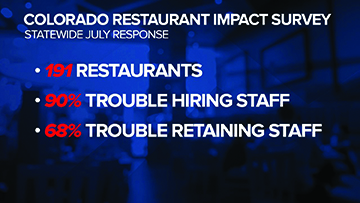
by Regan Bervar | Sep 27, 2021 | Editorials
If anything is good for pounding humility into you permanently, it’s the restaurant business. — Anthony Bourdain
 by Luke Schmaltz
by Luke Schmaltz
By the end of 2019, the Mile High City’s hospitality industry was humming at a fever pitch. The slave-wage, cutthroat, desperation-driven, mercenary mindset which has driven this profession for decades was charging forth at full steam. This pulsating, sweat-drenched beast, however, was unaware that it was about to splat face down onto the floor like a piping hot pizza that was dropped by an underpaid line cook who showed up to work sick.

Research by the Colorado Restaurant Association shows restaurant worker employment numbers are below pre-pandemic levels. Colorado Restaurant Association image
By late March of 2020, the industry was being systematically gutted by circumstance. In the span of several very long months, many once-coveted, hard-to-land FOH (front of the house) and BOH (back of the house) positions had become vacant and were up for grabs. The “Great Reopening” had revealed a vacuum in the workforce. Much of the previous labor pool, while locked down and on unemployment, have seemingly discovered other options — perhaps pursuits offering better compensation, lower stress and even (gasp) employee benefits.
Surf’s Down
 In May of this year, at the onset of patio season, the Colorado Restaurant Association reported that nine out of 10 restaurants were having trouble hiring. Meanwhile, the Bureau of Labor Statistics recently reported that between February of 2020 and June of 2021, a restaurant labor pool of 234,500 had recovered to a mere 223,600 — nearly 11,000 workers lower than the previous tally. This begs the question, “Where did they all go?”
In May of this year, at the onset of patio season, the Colorado Restaurant Association reported that nine out of 10 restaurants were having trouble hiring. Meanwhile, the Bureau of Labor Statistics recently reported that between February of 2020 and June of 2021, a restaurant labor pool of 234,500 had recovered to a mere 223,600 — nearly 11,000 workers lower than the previous tally. This begs the question, “Where did they all go?”
In some instances, highly valued, seasoned professionals with years of FOH and/or BOH experience have pivoted and moved onto other pursuits. For example, 14-year Denver industry worker Nolan Ackerman (Southside, Goosetown Tavern) says, “I used the pandemic to finish my bachelor’s and get an internship. I’m out, for now.”
Meanwhile across town, Denver industry veterans and wife/husband team Casey Keller and Roy Benoit have pivoted inward, courageously becoming restaurant owners in late summer of 2020 (Wendell’s, 3838 Tennyson St.) Thus far, attracting qualified help has been somewhat of a challenge, “Overall volume and quality of applicants has been… discouraging,” Benoit explains. When asked about where the talent pool of qualified workers has gone, Benoit has a revealing perspective. “I feel that a lot of previously full-time industry folks often have skills or education that makes them marketable in other fields… and the last year has given many of those people the opportunity and/or impetus to pursue those things,” he begins. “There are certainly some people still collecting unemployment; we’ve physically seen this in people scheduling or coming to interviews for the admitted sole purpose of required work searches. I will say, I feel more of those lingering on unemployment may not be industry ‘professionals,’ if you will, but rather newer or shorter-term industry workers.”
Rather than spend time waiting for external circumstances to improve, however, Keller and Benoit have curated their own strategy for cultivating and maintaining a solid crew. “We believe in paying our people well to begin with and ascribe to quality over quantity when it comes to staffing,” Benoit says. “We currently have a very talented and dedicated staff and have done our best to compensate them accordingly. Now, it is possible we’re shorting ourselves some applicants by not openly advertising above industry norm pay, but even with the current pool, we’d prefer to be choosy and give ourselves the opportunity to pay quality staff what they’re worth and continue to do so.”
On the front lines across Denver, newer industry recruits are having to shoulder heroic workloads as people are coming out in droves to rekindle the beloved American pastime of “going out.” Crews of veritable “newbies” are facing hordes of guests in the FOH and torrents of orders in the BOH that would give the most hardened of veterans the heebie jeebies. In some instances, in order to avoid staff burnout, some establishments are having to cut their hours of operation or to simply remain closed on certain days.
Not Always The Case

Bull & Bush Restaurant/Brewery has largely avoided staffing woes. Image courtesy of David Peterson
Other establishments such as the beloved Bull & Bush on Cherry Creek Dr. have managed to circumvent the labor shortage. Bar-tender Dave Hummel explains the company policy of starting FOH personnel as hosts/hostesses and requiring them to work their way into the higher paying positions of waiting tables and tending bar. This may explain their FOH employee retention rate — even amid the current climate. “The only [labor] shortage we are really having is in the BOH,” he says. Restaurant co-owner David Peterson (with brother Erik) confirms this, saying, “There were a bunch of people chomping at the bit to get back to work. There were a few who opted to stay away and collect unemployment. But, for the most part, we managed to keep most of our staff.” Peterson goes on to explain with a rare tone of optimism, “We have been so busy, unbelievably so, we are breaking record sales.”
This new climate, however, has given rise to a novel phenomenon previously unheard of by most restaurateurs — even a lifelong professional like David Peterson. Recently, an employee of his kitchen staff lobbied for a raise by saying that he could simply go to another restaurant in Cherry Creek and get paid $20 an hour to do far less work because the place would be half as busy. Peterson was unfazed, however, explaining, “Yeah, I get where the guy was coming from. But what he doesn’t realize is that if the place is slow, they might give you the same amount of money, but they are going to cut your hours.”

Bar Car retains a core staff through superior treatment of employees in a preferred establishment in which to work. Jeremy Matzke image
Just across Colorado Boulevard to the North, another long-cherished mainstay establishment has a similar story. Bar Car is a one-of-a-kind blink-and-you’ll-miss-it type of place. Owner Jeremy Matzke believes their company policies helped them deflect the post-shutdown woes. “Speaking strictly from a small, well established locally owned bar, our reputation has held strong, [as] we are a desired place to work,” He begins. “We firmly believe in treating our employees as humans with opinions and feelings and make extra efforts to treat our employees with grace and [as] part of our family … we feel this philosophy is much stronger than most incentives.”
A Nationwide Phenomenon
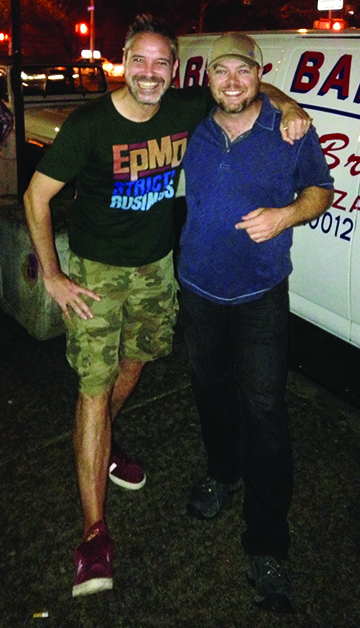
Former Denver bartender-turned NYC drink slinger Donald Murphy, left, believes the service industry labor shortage is a nationwide problem. Donald Murphy photo
Shifting focus to the nation as a whole, it is becoming clear this is not just a Denver phenomenon — but something possibly taking place from coast to coast. Former Denver bartender Donald Murphy aka “Murph” (Splinters from the Pine, Pasquini’s Uptown) now works as senior drink-slinger and art curator at Upper East Side Manhattan’s esteemed Merrion Square. “This is a nationwide problem,” he attests. “All of the career people who had time off during Covid decided to collect their UI benefits as though they were finally recouping the would-be tips from every time they got stiffed,” he begins. “A lot of people realized, with all that time off, they never really wanted these jobs in the first place. In order to thrive in this industry, you have to truly enjoy serving people, helping guests have a good time, and talking shit with strangers.” Murph goes on to explain that amid the political/presidential madhouse that began in 2016, working in the FOH is not nearly as fun because of a combative, general populace that is divided by social ideals like never before. Many people, when out in public, are either intentionally rude or overly sensitive. This might explain the unattractiveness of the service industry to many entry-level people. “Social division has made working in restaurants and bars not nearly as enjoyable,” he says.
Lopsided Demographics
Back in Denver, the labor shortage seems to be prevalent in some areas and nonexistent in others. For example, many businesses in the LoDo district, the Highlands and the RiNo district are short staffed while outliers in more suburban areas are not. This might also be explained by the average restaurant worker wage compared to the costs of living in these areas. After all, who wants to commute into a congested area, search for parking (if you even have a car), wait on people who live in the neighborhood and make more money than you (entitled a**holes), and then commute back home to your meager dwelling every day?
To combat this, restaurant owners, at least some, are adopting new business models with a variety of adaptations. Some feature higher hourly wages while others offer profit sharing for untipped workers and others are doing the unheard of by offering benefits to part-time, tipped employees. Yesterday’s service industry professionals who have moved on may catch wind of this and be taken aback in utter disbelief. Whether it brings them back into the fold, however, seems rather unlikely — but only time will tell.

by Regan Bervar | Sep 27, 2021 | Main Articles
“Space has the ability to produce a triple bottom line, or ROIII: Return on investment, innovation, and inspiration.” — Robert C. Jacobson
 by Luke Schmaltz
by Luke Schmaltz
If you ask most Colorado residents to name the top attractions that define their state, you’ll hear things like professional sports, recreational and medical cannabis, and year-round outdoor recreation and adventure. Yet, most folks may be unaware that, according to the Colorado Office of Economic Development and Economic Trade (choosecolorado.com), the Centennial State holds the top ranking in private aerospace employment concentration and is host to the nation’s second largest aerospace economy.

High Speed Flight: Boom Supersonic aims to use ultra-high-speed flight to get travelers to their destinations in under half the normal time.
A July 29, 2021, article in The Denver Post announced the addition of yet another aerospace company to the local roster — PteroDynamics — a California-based company that will soon be headquartered in Colorado Springs. The piece quotes Governor Jared Polis as saying, “Colorado continues to be the leader in aerospace and defense industries, so this new announcement and the 186 good news jobs that come with it further strengthens our reputation as the nation’s best place for aerospace.” Additionally, according to a 2020 report by the Metro Denver Economic Development Corporation, Colorado is home to 290 aerospace tech companies employing a total of 33,460 employees with over 500 organizations specializing in aerospace products and services. Over the past five years, aerospace employment has grown over 30% in Colorado — placing the state 12% higher than the national average.
The industrial roll call is impressive and diverse. The list of companies runs the gamut in terms of size and configuration — comprising a variety of private sector startups, medium-sized companies, and large corporations with household name recognition. While this is far and away from a comprehensive list, here is a brief sampling of the sort of incredible innovation and forward-thinking commerce taking place in your own backyard.
Boom Supersonic
According to Founder and CEO Blake Scholl, the Denver-based company was built on a philosophy of “Speed, safety, and sustainability without compromise,” as explained in a company promotional video. “We’ve made incredible advancements in the foundational technology for designing, developing, and building aircraft,” Scholl continues. “We have advanced aerodynamics, new materials, and significantly more efficient engines.” The company boasts the XB-1, the industry’s first-ever independently developed supersonic jet. Which has served, through trial, error, and improvements upon both to inform every aspect of the company’s passenger airliner, Overture. Boom Supersonic designed this commercial jet to serve travelers with flight times twice as fast as current commercial airlines.
Atomos Space

Missile Launch Technology: Boecore specializes in early warning missile launch technology, among other things.
Dedicated to meeting and exceeding the satellite-launching needs of the telecommunications industry, this award-winning Denver-based company is currently under contract with NASA. Their philosophy is to end the launching of single-use rockets to launch satellites into space. In a company website video, Co-Founder and CEO Vanessa Clark equates the current practice to “flying passengers one at a time in a Boeing 747.” She explains, “At Atomos, we are building and operating space tugs — transportation vehicles that are the connecting flights for space. Rockets no longer need to go to the specific orbit for a specific satellite. With space tugs, rockets can launch all satellites to a single drop off point, and we’ll take them from there.” Essentially, Atomos is the world’s first satellite rideshare company. The benefits are threefold: decreased cost to get into space, increased number of satellites per launch, and reduced wait times for a scheduled launch.
Boecore
This Colorado Springs-based aerospace and defense engineering company is women-owned and operated and maintains a small business status with fewer than 200 employees and a personnel-centric company culture. Their website states that they specialize “in software solutions, systems engineering, cybersecurity, enterprise networks, and mission operations.” With a client base consisting mainly of government agencies, Boecore boasts a highly respected company reputation as well as an impressive array of industry awards, including the 2020 Pro Patria Award for Extraordinary Employer Support, Entrepreneur of the Year Award, and Best Workplaces in Colorado Springs — among many others. Company innovations include early warning missile launch technology, space operations software solutions, Battlespace Operational Readiness Game (BORG) training modules, and many others.
York Space
This Denver-based company operates a “mega-facility” for commercial manufacture of satellites for companies who want to operate satellites in orbit. A news blog released earlier this year on the company website announced the recent expansion of its headquarters into a 100,000 square-foot facility. Company CEO Dirk Wallinger recently told CNBC the expansion adds “a true robust production capability to help secure our supply chain and help us expand the contracts that we’re working on with existing customers.” He went on to explain that the upgrade will take the company’s current manufacturing of 1,000 spacecraft per year and, “blow that out of the water as far as total production capacity goes.” York’s business model leverages a proprietary design known as the S-CLASS platform. The design is based on a three-axis stabilized spacecraft intended for constellations and designed for mass production. Buyers can use the modules for a variety of missions such as weather monitoring, communication, and observation.
The list goes on and on — including recognizable monikers such as Lockheed Martin, EnerSys, Merrick & Company, Ball Aerospace and Technologies Corporation, Ascent Solar, and many more.
It Begs The Question
With all these engineering geniuses in proximity, it is utterly baffling that Colorado — specifically the Front Range and the Western Slope I-70 corridor — are facing widespread engineering mishaps and systematic infrastructure breakdown. You would think that the elected leaders, with immediate access to such innovation and solution-oriented implementation, would reach out and ask for a bit of advice from folks who truly know how to solve problems. It is possible, however, that most of these aerospace firms have blocked incoming calls from government phone numbers. Or perhaps they are all simply too smart to get involved with politicians and bureaucrats. Or maybe — just maybe — given Colorado’s elevation and relative proximity to the stratosphere, they are all working in unison to find the quickest way off this troubled planet, if only for a little while.

















